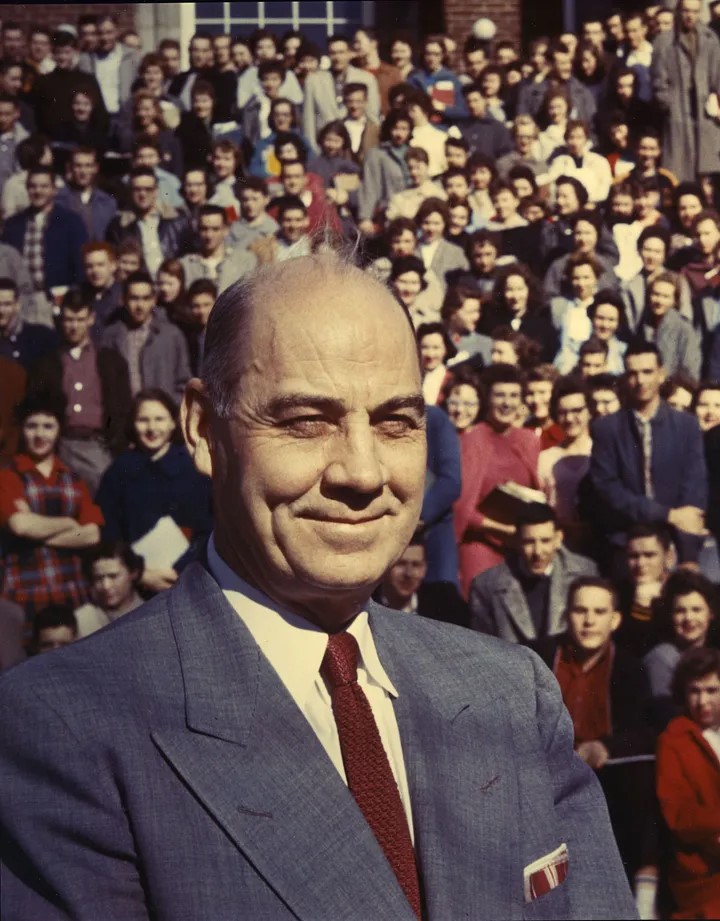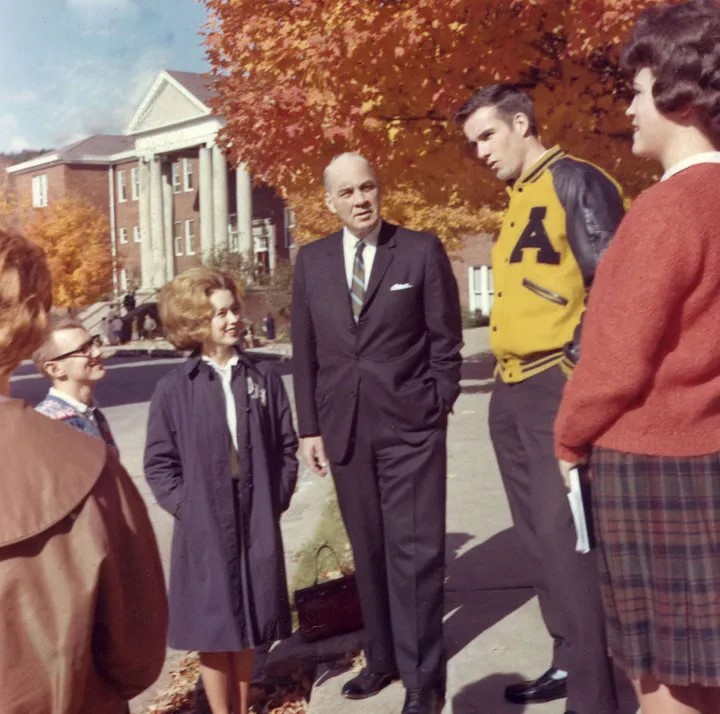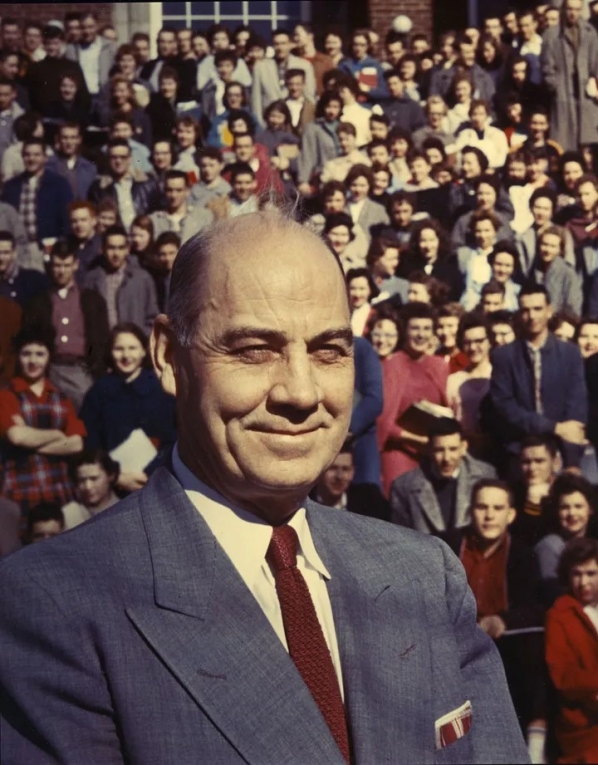This is a guest post by Mandi Burnison, a rare books and archives reference student assistant in Special Collections. Mandi is a junior, majoring in English Secondary Education.

President William Howard Plemmons
Who is the Plemmons Student Union Named After?
The Plemmons Student Union is named in honor of Dr. William Howard Plemmons, who was the president of Appalachian State Teachers College (ASTC) from 1955 to 1969. Dr. Plemmons was active on campus and with the community, making great changes to the college throughout his time as president.
W.H. Plemmons was born in Buncombe County, near Asheville, on June 11, 1904, and he died on October 7, 1984. Dr. Plemmons attended Wake Forest University and graduated with a Bachelor of Arts degree in history and English in 1928. In 1935, he received his Master of Arts in history from Duke University. In 1943, he received his Ph.D. in history and educational administration from the University of North Carolina at Chapel Hill.
W.H. Plemmons’ presence in the educational community made him a “nationally-recognized educator.” (1) Prior to his work at Appalachian State Teachers College (now Appalachian State University), Plemmons worked as a teacher and a principal in multiple high schools in the Asheville area. He taught high school from 1928 to 1933 and was a principal from 1935 to 1936. Between teaching and serving as a principal, he was a manager of a food store from 1933 to 1935 during the Depression. (2) He also worked various jobs for the University of North Carolina that included “a teaching fellow, 1941–43; admissions officer, 1943–46; registrar, 1944–46; associate professor, 1946–49; and, professor, 1949–55.” (2) His passion for education remained strong, as he was an active member and held office positions in local, state, and national educational communities and organizations:
- The National Education Association
- North Carolina Education Association
- Southern Council on Teacher Education
- Southern Association of Colleges and Universities
- Study of Teacher Education Curricula in North Carolina
- North Carolina Advisory Council on Teacher Education
- American Association of Colleges for Teacher Education
- The Governor’s Commission on the Appalachian Region
- Northwest North Carolina Development Association
- W.A.M.Y. Community Action, Incorporated (Watauga, Avery, Mitchell, and Yancey Counties, North Carolina)
- The President’s Council of the National Association of Intercollegiate Athletics
- Higher Education Advisory Committee
- American Association of State Colleges and Universities (AASCU) (he helped found in 1951)
W.H. Plemmons was inaugurated as the college’s president on April 24, 1956. During his tenure, the university’s curriculum was expanded and “additional outstanding faculty” were appointed. (2) One of the ways curriculum was expanded was the addition of a required reading class for freshmen. (3) His changes to the campus led him to be known as the “builder president,” because the university saw new buildings, improved landscaping, and the campus was “made whole with several city streets closed” during his years as president. (2) The student enrollment at ASTC rose from 2,400 in 1958 to over 5,000 by 1968. More than 300 full-time faculty members were added, and more than 25 construction projects took place during Plemmons’ presidency. (4)

President William Howard Plemmons with students
Along with the impact W. H. Plemmons made on the physical campus, he also made an impact on the college community with his “approachable manner.” (4) He “is credited with coining the phrase ‘The Appalachian Family.’” (5) He was an active president, “seldom missing team events and constantly rallying the support of faculty and students.” (4) He was “described by his associates at ASTC and throughout the state as a warm, friendly, sincere person who has genuine interest in people. He is thoughtful and considerate of those that work with him. His dynamic personality seems to draw people to him.” (6)
On July 1, 1967, Appalachian State Teachers College became Appalachian State University after the North Carolina State Legislature passed Senate Bill 563, which gave the college university status. (7, 8) After achieving university status, the College of Arts and Sciences, the College of Fine and Applied Arts, and the College of Education were formed. (9)
Notes
1 “Plemmons bust on display in Washington.” Plemmons, William Howard, Dr. — 2nd President Vertical File, University Archives and Records, Special Collections, Appalachian State University
2 “William H Plemmons Biography” Plemmons, William Howard, Dr. — 2nd President Vertical File, University Archives and Records, Special Collections, Appalachian State University
3 Price, Uberto. “Developmental Reading for all College Freshmen.” Journal of Reading, 9, no. 5 (Apr. 1966): 333–334. (https://www.jstor.org/stable/40011107)
4 Mellott, Jack, Mike Rominger, Charles Shoffner, and Ruth D. Currie. Appalachian State University: The First Hundred Years. Prospect, Ky.: Harmony House Publishers Louisville, 1998, p. 6.
5 “The Appalachian Family.” Plemmons, William Howard, Dr. — 2nd President Vertical File, University Archives and Records, Special Collections, Appalachian State University
6 “Dr. W. H. Plemmons, Educator of Educators, Third ASTC Prexy.” Plemmons, William Howard, Dr. — 2nd President Vertical File, University Archives and Records, Special Collections, Appalachian State University
7 “How It Happened — The Inside Story on The University Bill.” The Appalachian Student Newspaper. July 21, 1967. University Archives, Special Collections, Appalachian State University, Boone, N.C. (https://omeka.library.appstate.edu/collections/show/23)
8 “Senate Bill 563.” North Carolina General Assembly — 1967 Session. https://www.ncleg.net/enactedlegislation/sessionlaws/pdf/1967-1968/sl1967-1038.pdf
9 “Appalachian State University Historical Timelines — General Events 1960–1969.” University Archives, Special Collections, Appalachian State University, Boone, N.C. https://collections.library.appstate.edu/collections/university-archives-records-management-services/timelines.

